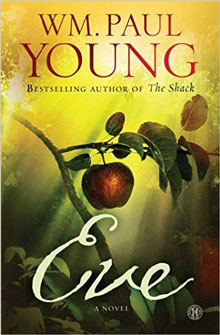Eve: A Review

Wm. Paul Young is the author of the best-selling novel The Shack, and his new release, Eve: A Novel, is a #1 Amazon best-seller in biographical fiction as of the writing of this review. Unfortunately, its best-seller status means that the bad theology in the book is reaching many readers. While some would protest that this is just a fictional story, even fictional stories can convey theology, and Young’s has not improved since he wrote The Shack. Spoiler alert: this review will discuss major points of the plot.
The story revolves around a girl named Lilly, who arrives badly injured, but who is apparently very important as a Witness to creation. We find out through the story that this means she has visions (or hallucinations) of the process of creation, Adam and Eve in the garden, and their Fall. The possibility is introduced, however, that Lilly might be able to enter the events in the Garden to prevent the Fall of mankind.
Theology of the Trinity
Young’s theology of the Trinity was a major area that reviewers criticized about The Shack. In Eve, he uses the fact that the Hebrew word ruach is feminine to justify referring to the Holy Spirit with feminine pronouns. To use an artifact of Hebrew grammar to overturn the clear teaching of the relational maleness of the Holy Spirit (for whom Scripture uses male pronouns) takes too much liberty. See an analysis of why this is flawed. Another troubling aspect to Young’s attribution of femaleness to God is that he depicts Adam being literally suckled by God as an infant. Young avoids using the biblical names Father, Son, and Holy Spirit for the Trinity.
While God created both men and women in His image, God always portrays Himself in Scripture as relationally male. This does not demean women (in fact, sometimes women may have an advantage, such as understanding the imagery of the church as the bride of Christ!); rather, it expresses certain truths about God.
Young portrays a God who is loving, but not in control of how events unfold. Rather, God must respond to Adam, Eve, and even Lilly’s choices—a form of open theism. This contradicts Scripture, which presents God as in control and sovereign.
Theology of Creation
In the acknowledgements at the end of the book, Young thanks Hugh Ross, Fuz Rana, and Reasons to Believe, who he says “helped me to craft the days of creation in a way respectful to both the text and to science” (p. 301). The story presents a creation that took billions of years, a moon and stars that were created on ‘the first day’ and simply revealed on ‘the fourth day’. We have amply critiqued Ross’s views on creation, to the point of writing a whole book against them. But at least here they are in the proper fictional format!
Unconstrained by six normal-length creation days, Young portrays God as creating Adam as an infant and growing to adulthood alone without Eve. Only when he begins to lose satisfaction in his relationship with God alone does God cause Adam to become pregnant (!) with Eve, who is born and grows up before they are married. Seeing Eve as someone who was only created when Adam began to grow dissatisfied with his relationship with God has troubling theological implications, especially compared to the biblical view that Adam existed for only a short time (part of a day) without Eve, and God intended to create her from the beginning.
Theology of the Fall
Young portrays the Fall as something gradual; a loss of interest or satisfaction in Adam’s relationship with God. Eating the fruit only was the final step of this fall in the story. Young also portrays Eve as repenting, allowing her to stay in Eden with God, while rebellious Adam was cast out. She only leaves Eden because she loves him so much. Eve is actually presented as a guru throughout the book, as a mystical guide and spiritual mother.
Theology of Christ’s bride
Part of the central point of the plot is that there are three pivotal women through history—Eve, to whom the promise of the Seed was given, Mary, the mother of the Seed, and the woman who would marry the Seed. Young’s heavy-handed foreshadowing means that no one is actually surprised when Lilly ends up being the Bride. This is actually a serious theological error, because the Church is presented as the Bride of Christ—no one person will ever be married to Jesus, but the Church collectively will be His Bride.
It is also troubling that Young portrays femininity as ‘special’—it is women who are pivotal throughout history, who are superior spiritual guides, who have the mystical power to bring life into being. Scripture, while presenting a positive view of women as people created in the image of God, does not exalt them to this almost-goddess status; it gives an honest portrayal of their faith and of their sinfulness, their need for a Saviour. And Young’s plot revolving around the pivotal women means that he almost completely neglects the Man that stands at the center of history, Jesus.
Other missteps
Young’s writing style is cloyingly florid; he is overly fond of adjectives and nonsensical analogies. The book would have been stronger stylistically if he had taken out half of these at random. The book jumps between perspectives, and between consciousness and dreaming/hallucination, so often that it leaves the reader disoriented, which may have been deliberate on Young’s part.
Perhaps in an attempt to make Lilly seem more believable as a character, Young has Lilly use mild profanity in several places. It felt needless and contrived.
Eve isn’t good storytelling, and it contains terrible theology. It is saddening that such a trite mess should be a best-seller.



Readers’ comments
Comments are automatically closed 14 days after publication.